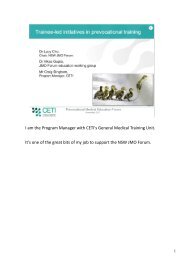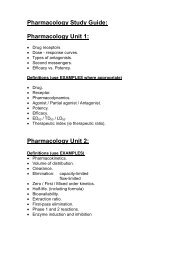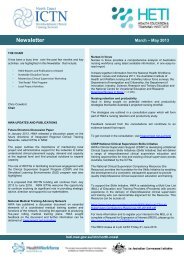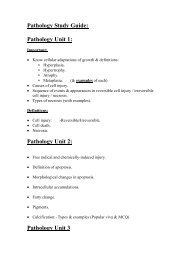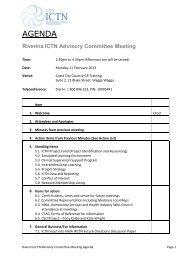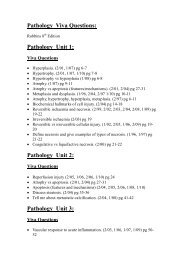a handbook for supervising allied health professionals - HETI - NSW ...
a handbook for supervising allied health professionals - HETI - NSW ...
a handbook for supervising allied health professionals - HETI - NSW ...
You also want an ePaper? Increase the reach of your titles
YUMPU automatically turns print PDFs into web optimized ePapers that Google loves.
THE SUPERGUIDE<br />
Common challenges <strong>for</strong> supervisors<br />
66<br />
The goal of supervision is to bring out the best in every staff member. There are often<br />
challenging moments on the way to this goal. The challenges are unique to the individual<br />
and require solutions tailored to the circumstances. Many problems can be avoided<br />
by carefully orienting the clinician to their role and to the organisation, setting clear<br />
expectations and establishing a supervision contract. This will go a long way towards<br />
preventing any misunderstandings and alert the supervisor to issues that may need<br />
management.<br />
It is recognised that most clinicians receive little or no <strong>for</strong>mal training in managing<br />
staff issues and often acquire these skills through experience and/or modelling other<br />
senior staff behaviour. It is important that supervisors and managers invest in their own<br />
professional development and supervision to improve confidence in managing complex<br />
issues.<br />
Many factors may affect a clinician’s per<strong>for</strong>mance. Some of the more common issues<br />
(and potential responses) are listed below. The first response to any problem should<br />
involve a face-to-face discussion with the clinician. If the issues involved are sensitive,<br />
this should be conducted in a private location, free from interruptions and at a time when<br />
neither is distracted or overstressed. If the issues are serious or if attempts to resolve the<br />
issues are failing, it is appropriate to seek additional assistance. In particular, if supervision<br />
is provided separate to line management responsibilities, the line manager should be<br />
consulted.<br />
Challenges and solutions<br />
The clinician with communication problems: Does the clinician recognise that<br />
communication is a problem If yes, remediation can be relatively straight<strong>for</strong>ward (eg,<br />
writing courses, conversational practice, providing scripts or templates to model effective<br />
communication practices, providing a mentor or buddy, use of audiovisual equipment). If no,<br />
then the issue is more complex, because the solution has to begin with the clinician gaining<br />
insight into the problem. For example, members of the clinical team may report that the<br />
clinician is impolite and uncommunicative while the clinician considers that he/she is efficient<br />
and focused. Readjusting the clinician’s perceptions involves developing his or her empathic<br />
ability and, if identified as a problem, should become the focus of supervision.<br />
The clinician who is uninterested in the area of clinical work: It is best to identify this<br />
early and plan accordingly. In some instances, the clinician’s lack of interest will be based<br />
on a misconception of the content of the work or on a failure to appreciate its relevance<br />
to their area of interest. In many cases, the supervisor can highlight aspects of the work<br />
that will be of interest to the clinician. In others, an appeal to the clinician’s sense of<br />
responsibility to the team may motivate them.



